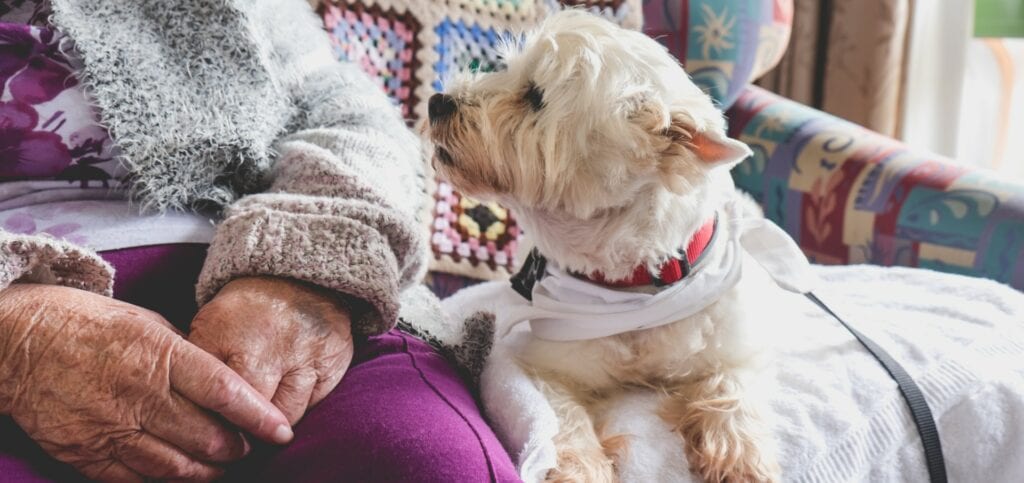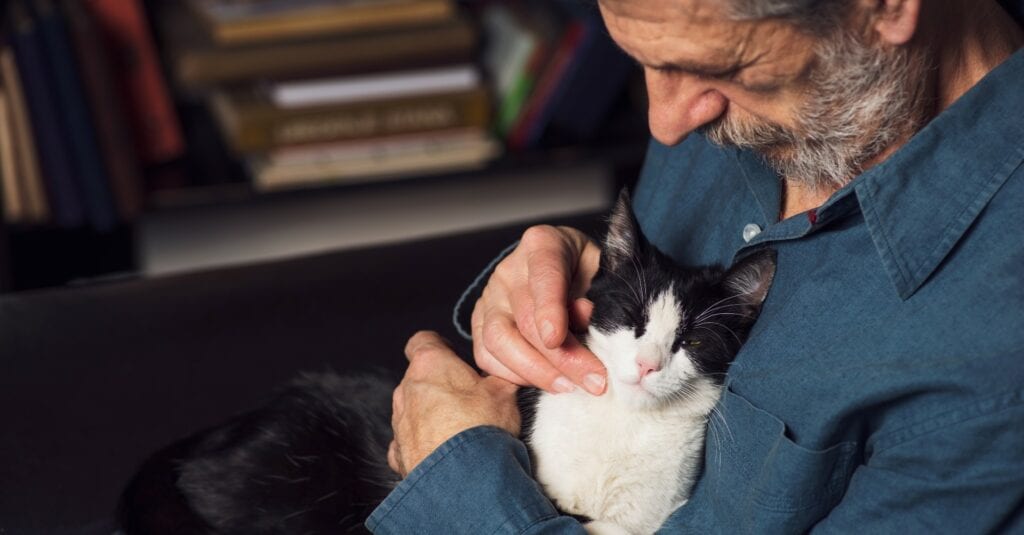
As your loved ones age, there are many things to consider. Is it time for them to join an independent or assisted living community? Where does your loved one find socialization and community? How can you help them improve their life?
You may be surprised at one of the most common things that gets prescribed for aging parents: animals. Aging can be a lonely experience. As family members and friends move around or pass away, your loved ones can find themselves struggling to engage in activities or socialize. Companion pets are a great way to remedy this loneliness.
Is a pet companion the right choice for your aging family member? Let’s take a look at all the benefits and considerations that come with companion animals.
Companion Pets Have Many Benefits for Seniors
There are many benefits of owning a pet, no matter what your age. For your aging loved one, a pet can drastically help improve their mental and physical health.
Mental Health
Companion pets help create routines that can be helpful for anyone but especially for loved ones living with dementia or Alzheimer’s. In the brain, routines get stored in long-term memory, so creating a routine with a pet can help create order and predictability during the day. Additionally, routines foster a sense of higher self-esteem and independence which is invaluable to your aging loved one.
Depending on the pet, routines can involve:
- Feeding
- Walking
- Playtime
- Cleaning
- Bathroom breaks
Another key emotional benefit of companion animals is that they help combat loneliness. Pets ensure that your loved one is never alone. Even if your loved one decides to live in a sociable independent living community, a pet will give them company during the times they are by themselves.
Depression can stem from loneliness, and aging pet owners have been found to have reduced levels of depression compared to their peers who don’t own pets. Most pets love their owners unconditionally, and the feeling of being needed by another living creature can bring happiness and reduced stress levels to your aging loved one. Pets rely on their owners for care and play, so this can give a sense of purpose to your loved one.
Physical Health
If your loved one is still physically active, a companion pet can help keep them that way. Especially in the case of owning a dog, they will get into the routine of walking and exercising with their dog each day.
According to a study performed by the American Heart Association, dog ownership was associated with a lower risk of death for heart attack and stroke survivors who live alone. The increase in physical activity, as well as decreased loneliness and depression, are most likely to thank for reducing cardiac risk. Compared to non-owners, dog owners experienced:
- 65% reduced risk of death after a heart attack
- 24% reduced risk of all-cause mortality
- 31% reduced risk of death due to cardiovascular issues
Besides dogs, other pets encourage their owners to get more exercise. Some cats and rabbits loved to be walked outside on a leash! This exercise helps reduce blood pressure, cholesterol, and obesity for your aging loved one.
Things to Consider
The positives of a pet companion are significant. However, some people may not be the best candidate for pet ownership. Additionally, some pets may be better choices than others depending on your loved one’s situation. Consider the following things to help you decide about pet ownership for your parent.
Ability or Disability
Does your aging loved one have any mobility limitations? If your parent relies on a walker, wheelchair, or cane, an active dog is probably not the best choice for them. If your loved one is still cognitively sound and desires the companionship, consider a lower maintenance pet such as a:
- Cat
- Rabbit
- Bird
- Guinea Pig
If your loved one is very infirm, they may be a good candidate for a specially trained therapy or service dog. A therapy dog will help them function and feel protected at home and on outings.

Animal Temperament and Age
Young animals such as puppies and kittens are not very ideal for aging people. These young animals require intensive care and meticulous training which can get to be too much for your aging loved one. Young animals can interrupt sleep patterns, bite and scratch, and have bathroom accidents in the home.
Adult-aged cats and dogs that are already trained are ideal for your loved one. They have settled into their personalities and tend to have a calmer temperament. Certain breeds have calmer, more ideal temperaments.
The best dog breeds for your aging loved one include:
- Cavalier King Charles Spaniel
- French Bulldog
- Bichon Frise
- Greyhound
Most domesticated cats have similar temperaments as they age, but certain breeds that are known to have good temperaments are:
- Ragdolls
- British shorthairs
- Birmans
Birds also make great companion pets. Some of the best bird breeds are:
- Parakeets
- Canaries
- Zebra finches
How Many Pets?
Even though animal shelters will often encourage people to adopt 2 kittens at once, that is probably not the best scenario for your aging loved one. Multiple pets often entertain each other rather than bonding with their owner.
One adult-aged pet is usually the best choice for your loved one. This way, they can give their pet all of their attention and love without getting overwhelmed with responsibility.
Contingency Plan
Make sure that there is a backup plan for the pet if your loved one experiences complications. If they need to stay in the hospital or rehabilitation facility for a period of time, is there someone who can care for the pet in their absence?
Certain breeds of pets can live for a long time, so it is also a good idea to have a plan for who will take care of the pet if it is on track to outlive its owner. Try to avoid placing the pet back in a shelter, although that is an option if nothing else works out.
Where to Find a Pet Companion
If your loved one is not particular about a certain breed of pet, it is always a great idea to adopt a pet from a local animal shelter or rescue program. Adopting a pet through a humane society gives the animal a second chance at a loving home.
If your loved one wants a certain breed, there are often rescue organizations that work to rehome specific breeds of animals. You may even be able to find an organization near you that works to pair animals with aging owners.
Consider a Companion Animal Today
Companion pets improve your loved one’s quality of life by reducing loneliness and depression and increasing physical activity and socialization. If it sounds like your aging loved one would be a great candidate for pet ownership, don’t wait to get started.
Don’t let pets stop your loved one from joining a great independent living community. At New Perspective, we welcome companion pets for the residents. Reach out to us today if you have more questions about companion pets at any of our communities.

